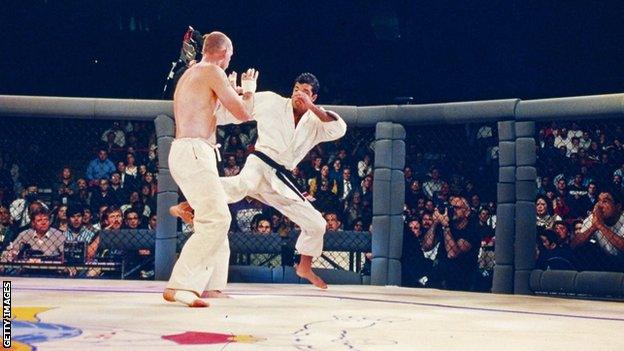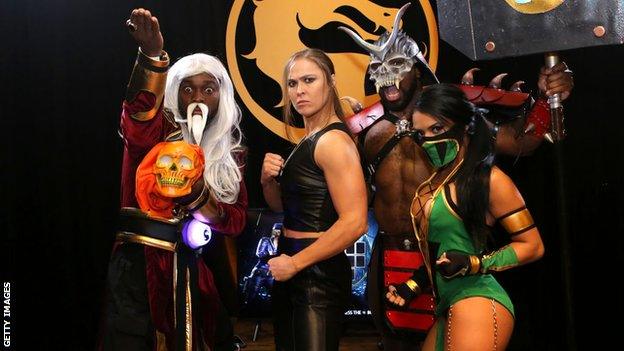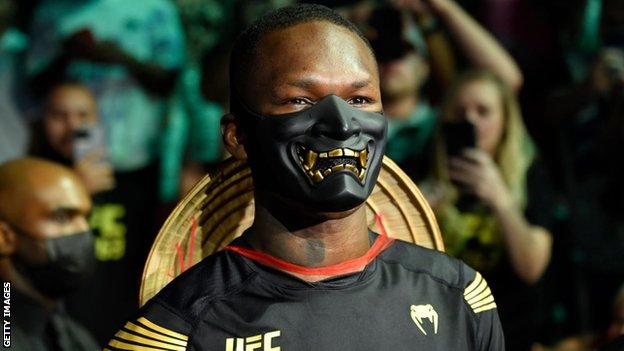How Mortal Kombat and video games helped shape the UFC
- Published
UFC at 25: Things were a lot different back at UFC 1
In the early 1990s, the arcade fighting video game genre was exploding.
Both Mortal Kombat 2 and Super Street Fighter 2 were hugely popular and became some of the highest grossing arcade games of all time, inspiring other franchises like Tekken and Soul Calibre.
Against this backdrop, UFC 1: The Beginning took place at the McNichols Sports Arena in Denver, Colorado on 12 November 1993. The event featured an array of fighters, each with their own unique martial arts discipline, competing in a one-night tournament to see which fighting style would be the most effective.
Art Davie, the original founder of the UFC says "video games had only a peripheral influence on the UFC" but co-creator and executive producer of the UFC, Campbell McLaren admits that Mortal Kombat in particular had a strong influence.
"I visualised a real-life version of Mortal Kombat after meeting [co-founder] Rorion Gracie and hearing his idea for a 'War of the Worlds' competition," McLaren explains.
"I was able to make the first event look like Mortal Kombat - we just didn't yell 'Finish Him!'."
'UFC and video games had the same audience'
According to McLaren, the creation of the octagon was born from discussions between himself and Conan the Barbarian director John Millius, who suggested an octagon with Greek pillars and columns.
McLaren instead opted for a "modern, techie, urban-looking setting" and used chain-link fence and a steel gate to provide a more "Mortal Kombat look".

UFC 1 in 1993 drew inspiration from video games like Mortal Kombat
Another similarity was the marketing. Both conditioned the audience to presume an abundance of blood and guts, with marketing taglines like 'Two Men Enter. One Man Leaves' and 'So Real It Hurts'.
The marketing was similar enough toMortal Kombat to alarm US lawmakers with Senator John McCain leading a campaign against the UFC shortly after the first event. Ultimately the UFC would be banned in most States and the MMA ban in New York would not be lifted until 2016.
The extreme marketing might have been a mis-step, but McLaren explains: "The UFC and video games absolutely had the same audience."
The comparisons didn't go unnoticed and Art Jimmerson, one of the original competitors in UFC 1 remembers what people were saying at the time.
"They talked about it being a Mortal Kombat game in reality," he recalls.
MMA becomes the inspiration

Ronday Rousey voiced Sonya Blade in a game in 2019
Twenty years later, roles are reversed with the popularity of the UFC now influencing modern iterations of Mortal Kombat.
"It was inevitable that video games would incorporate MMA fighters in addition to, or in place of, other martial artists," Davie says.
The 2021 Mortal Kombat film revolves around MMA fighter Cole Young. The actor Lewis Tan said he based part of his character on UFC superstar Jorge Masvidal. In 2019, legend of the sport Ronda Rousey voiced the iconic character Sonya Blade, proclaiming that she has "always emulated her".
Watch: Is this the greatest UFC knockout ever?
Although the UFC would later break away from the barbaric presentation, and solidify MMA as a legitimate sport by introducing rules, uniforms and embracing regulation, the influence of this video game culture remains.
UFC fighter Uriah Hall has long been outspoken for his love of the arcade fighting video game, Tekken.
"Every time I would see a cool move in Tekken, I would practice until I got good at it," he says. "Then at training, they would be like - what the hell was that?!"
Another UFC fighter, Max Holloway claimed that console versions of the sport helped him develop techniques.
Cross-overs to continue...

Israel Adesanya entered the octagon dressed as Mortal Kombat character Raiden
Many fighters have even incorporated references to Mortal Kombatin their walkouts and winning celebrations. Middleweight champion Israel Adesanya walked out dressed as character Raiden at UFC 263 in June.
Heavyweight Curtis Blaydes walked out to the theme tune in 2017 and Bellator star Michael 'Venom' Page would incorporate the 'spine fatality' in a post-fight celebration.
Even finishes get likened to the video games. Joaquin Buckley's knockout of Impa Kasanganay in 2020 was compared to Tekken character Lee Chaolan's 'Mist Trap Throw'.
The UFC's decision to move operations to 'Fight Island' in Abu Dhabi during the pandemic had fans comparing it to the synopsis of Mortal Kombat whereby "Martial artists are summoned to a mysterious island to compete in a tournament".
"I have the invitation to Mortal Kombat," was Alexander Volkanovski's response when he was booked to defend his UFC title on 'Fight Island'.
The crossover appeal of video games in MMA is growing rapidly. Fighters like Holloway, Stephen Thompson, Sean O'Malley and Demetrius Johnson all generate extra revenue from their Twitch channels, playing video games.
'Wonderboy' Thompson explains the the symmetry: "It [Mortal Kombat] gave me a vibe of anime, it inspires me to train harder."
With a new film and game planned, the link is set to continue.